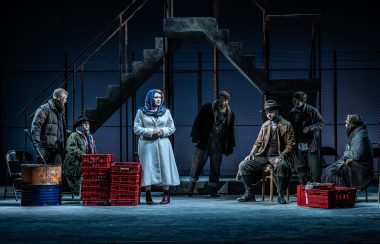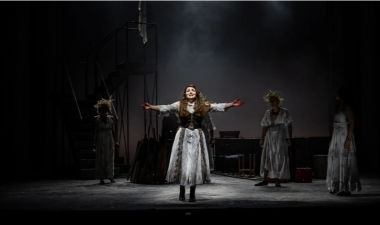
 Ireland Wexford Festival Opera 2023 [2] – Camille Erlanger’s L’Aube rouge: Soloists, Chorus and Orchestra of Wexford Festival Opera / Christophe Manien (conductor). O’Reilly Theatre, National Opera House, Wexford, Ireland, 1.11.2023. (RB)
Ireland Wexford Festival Opera 2023 [2] – Camille Erlanger’s L’Aube rouge: Soloists, Chorus and Orchestra of Wexford Festival Opera / Christophe Manien (conductor). O’Reilly Theatre, National Opera House, Wexford, Ireland, 1.11.2023. (RB)

The second opera to feature at Wexford this year, L’Aube rouge (‘The Red Dawn’), introduced us to the music of Camille Erlanger. I was not familiar with Erlanger’s music prior to this performance but he enjoyed much success in his heyday at the end of the nineteenth century and composed nine operas. He studied with Delibes at the Paris Conservatory. Like many French composers of his generation, he was in thrall to German music and one can certainly hear the influence of Wagner in L’Aube rouge.
The plot revolves around Serge Markariev, who is the leader of a group of anarchists in nineteenth-century St Petersburg. Serge is in love with Olga, the daughter of a general who executed the previous leader of the anarchist group. The two lovers cause tensions within the group, who are initially hostile to Olga, but she succeeds in winning them over. Olga’s father tries to marry her off to a French surgeon, Pierre de Ruys, but she and Serge elope to Paris. Serge is shot in Paris by one of the anarchists who believes he has betrayed their cause and Olga must plead with her previous marriage suitor, de Ruys to save him. In the final act, Serge and Olga travel back to Russia where Serge detonates a suicide bomb designed to kill the Grand Duke. When Olga hears the news she collapses and dies of a broken heart.
Erlanger’s music is typical of late-Romantic music with its heavy orchestration and chromatic harmonies. There were a few attractive moments in the score, including an allusion to Mendelssohn’s wedding march in Act II, but in general I found the music insubstantial and not particularly engaging. It worked in the same way as film music, complementing the action on stage and heightening tension at key points. Having said that, the opera worked well as drama, and I was conscious of becoming increasingly caught up with the plight of the main characters.
I had mixed feelings about Ella Marchment’s production. A giant countdown electronic clock was projected on to the stage at the beginning of the production and reappeared at the beginning of successive acts as the demise of the two main characters drew closer. Holly Piggott’s sets and costumes were effective, although it was difficult to place the action either in terms of its location or time. Stairways tended to dominate the sets, although they were not always effective. Fluid set changes allowed the drama to unfold at pace which was important for this opera. There was a well-choreographed pagan dance sequence in Act IV, which formed a backdrop to the climactic final moments of the opera. This helped to ratchet up the dramatic tension as the final dénouement approached.
The events in the opera could have provided an opportunity to explore current political events in Russia in terms of the clamping down on dissent and the invasion of Ukraine. The production did not allude to any of this, and I thought a potential opportunity was lost.

Andreea Soare was magnificent in the role of Olga. She dominated every scene in the opera and was excellent in ratcheting up the dramatic tension at key points. She was firm and resourceful in facing up to the Police in Act I; she displayed steely determination in separating from de Ruys in Act II, and desperation as she later pleaded with de Ruys to save her lover. She has a very powerful voice which continually rose above the assembled orchestral forces, and she was strong throughout the vocal range. She also demonstrated great tenderness and delicacy in the quieter moments of the opera as she reflected on her love for Serge.
Andrew Morstein did a reasonably good job portraying Serge though he was not able to match Soare either vocally or dramatically in pivotal scenes. Morstein was convincing in the role for the most part without the vocal heft necessary to play this role and at various points he was drowned out by the orchestra. Philippe-Nicolas Martin was impressive as de Ruys and he seemed a better match for Soare in the scene where she pleads with him to save her lover. Martin captured the conflicted elements of the character and his strong baritone voice projected forcefully against large orchestral forces. The anarchists all performed well and I was particularly impressed with Giorgi Manoshvili. He has a wonderfully powerful and richly coloured bass voice, and he clearly has the potential to take on much bigger roles in future.
Christophe Manien kept the soloists and orchestra on track and he injected pace and momentum into the music. Erlanger’s music is mediocre at best, but Manien made the most of the few short sections which were a little more inventive – for example in the dance music at the beginning of the second act. The Wexford Festival Orchestra did a fine job creating the rich late Romantic textures and bringing out the brooding, heady nature of the score.
There was much to admire in this production and Andreea Soare is clearly one of the stars of this year’s festival.
Robert Beattie
Production:
Director – Ella Marchment
Set and Costume designer – Holly Piggott
Lighting designer – Daniele Naldi
Choreographer – Luisa Baldinetti
Assistant Director – Eloise Lally
Cast:
Olga – Andreea Soare
Serge – Andrew Morstein
Natacha and Soeur Therèse – Emma Jüngling
Sonia – Ava Dodd
La Comtesse and Soeur Marthe – Dominica Williams
Kouraguine – Giorgi Manoshvili
Pierre de Ruys – Phillippe-Nicolas Martin
Le Grand duc Gregorief – Rory Musgrave
Vassili and Un Chanteur Napolitain – Thomas Birch
Dame 1 – Ami Hewitt
Dame 2 – Leah Redmond
Dame 3 – Corina Ignat
Dame 4 Judith le Breuilly
Le General Lovarof – Conor Baiano
Tatiana – Hannah O’Brien
Un Capitaine and Un Interne – Andrii Kharlamov
Danilo – Rory Lynch
Yvan – Gabriel Seawright
Une Autre Voix – Vladimir Sima
Dancers – Andrea Bassi, Roberto Capone, Yaimara Gomez Fabre, Andrea Zanforlin
